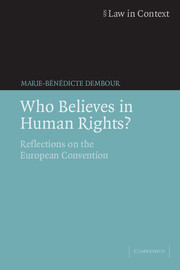Book contents
- Frontmatter
- Contents
- Acknowledgements
- Table of cases
- List of tables
- 1 Introduction
- 2 The Convention in outline
- 3 The Convention in a realist light
- 4 The Convention in a utilitarian light
- 5 The Convention in a Marxist light
- 6 The Convention in a particularist light
- 7 The Convention in a feminist light
- 8 The human rights creed in four schools
- 9 Conclusion: In praise of human rights nihilism
- Appendices
- Select Bibliography
- Index
- References
Select Bibliography
Published online by Cambridge University Press: 03 February 2010
- Frontmatter
- Contents
- Acknowledgements
- Table of cases
- List of tables
- 1 Introduction
- 2 The Convention in outline
- 3 The Convention in a realist light
- 4 The Convention in a utilitarian light
- 5 The Convention in a Marxist light
- 6 The Convention in a particularist light
- 7 The Convention in a feminist light
- 8 The human rights creed in four schools
- 9 Conclusion: In praise of human rights nihilism
- Appendices
- Select Bibliography
- Index
- References
- Type
- Chapter
- Information
- Who Believes in Human Rights?Reflections on the European Convention, pp. 285 - 295Publisher: Cambridge University PressPrint publication year: 2006



